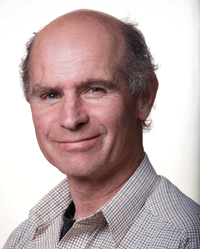2010 FW Awards: Beef Farmer of the Year finalist – William Ritch

William Ritch is a livestock producer who shares his customers’ passion for quality beef. It is an interest that has driven all decision making with his breeding and finishing beef cattle business at East Fingask, Oldmeldrum, Aberdeenshire.
The 710-acre business, which includes growing malting barley and finishing store lambs, has been in the Ritch family since 1944 when they moved from the island of Orkney during the war.
William, his father George and one employee, Kenny Alexander, are self sufficient in handling all their own agronomy and spraying with little work contracted out. The main farm is 450 acres and there are three other blocks of between 80 and 90 acres within three miles of the main unit.
Their usual cropping is 400 acres of barley, 300 acres of grass and 10 acres of swedes but William explains why he has changed tactics. “With the low price of barley and high price of fertiliser, we haven’t ploughed grass for a couple of years here, so this year we have 373 acres of barley, 325 acres of grass and 12 acres of swedes – indulging ourselves in a bit of fertility building,” he said.
These enterprises are integrated to provide straw for feeding and bedding the cattle in the winter. William prefers to calve about 120 cows but this has fallen back a little this year, so 20 home-bred heifers will be bulled to increase numbers and 39 finishing heifers have been bought to match the home-bred ones to keep up supplies to the butcher and restaurant trade in Scotland. He has five Aberdeen Angus bulls and the cows run in four groups of about 30 with surplus bulls running with bulling heifers.
“We have only recently got into the breeding side of the business,” said William. “My family were traditionally cattle finishers, but in the mid 1990s I began to worry about the integrity of the Scotch beef brand and decided to start a breeding herd.”
William consulted his local butcher and asked what he would require if he were to become a regular supplier. The butcher wanted only heifers sired by Aberdeen Angus with carcasses weighing less than 300kg. It took him several years to find a bull he thought was good enough to meet the specification, but he began producing calves in February 1999 using black, Limousin cross heifers to deliver good conformation.
“The Aberdeen Angus has improved so much in the past 10 years that I am now happy to use my home-bred heifers sired by Aberdeen Angus, but I still think the Limousin influence is a great benefit,” he said.
His policy is to buy bulls only from pedigree breeders in the north east of Scotland at the Perth bull sales but he has access in advance of what is available as a member of the Aberdeen Angus breeders club.
Cows are turned out in April on new grass growth and have access to silage covered in minerals for the first week out. There after they will have only grass and free access minerals until October when they are given silage again before housing.
All steers and heavy heifers not required by the local butcher are killed at the Scotch Premier abattoir and sold at a premium to Peter Allen of Aubrey Allen catering butchers in Coventry. “It is a great boost to the self esteem when I hear chefs talking with enthusiasm about my beef and, when strolling through my village, there is nothing better than meeting someone who tells me how much they enjoyed a steak or roast from one of my cattle. The whole essence of this business is getting on with people and giving them what they want,” he said.
A key role is played by the fulltime employee Kenny who is that rare combination of being a good stockman as well as a highly skilled mechanic. William described him as a “first class farmworker” who volunteered to freeze his own wages when business was tight.
William’s wife Jennifer is a local GP and neither his daughter Stephanie nor son Michael are involved with the farm, although he suspects his son might be interested once his chemical engineering career is established.
He sees a bright outlook providing he can “go on to be financially self sufficient” and less dependent on the SFP. “It is the first time in my career that the cattle are actually making money,” he said. “The past two years have been the best and you can’t get better than that.”
FARM FACTS
• East Fingask, Oldmeldrum, Aberdeenshire
• Type of enterprise:> Breeding and finishing Aberdeen Angus cattle
• Growing malting barley and finishing store lambs
• Farms size<: 710 acres
• Herd size: 120 cows plus followers
• Financials:> Turnover £200,000. Profit £60,000 including SFP
THE JUDGES LIKED
• Found his market and working with outlets to produce exactly what the customer needs
• Quality stock driven by his stockman’s eye
• Traditional family farm without being stuck in his ways and with an eye for the environment
